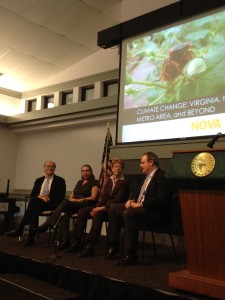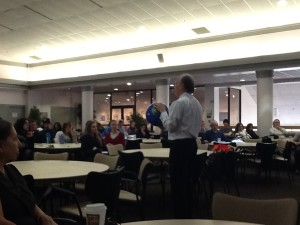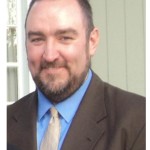We have much more to do and your continued support is needed now more than ever.
5th Annual Climate Change Symposium at Northern Virginia Community College
Guest post by Robert Johnson, Sustainability Officer, Northern Virginia Community College (NOVA)
Robert Johnson joined NOVA in October 2012 as the College’s first Environmental Sustainability Officer. He is focused on developing a Sustainability Strategy for the College, completing its first greenhouse gas inventory, implementing projects to reduce the College’s carbon footprint, and educating future generations about environmental sustainability. He was most recently a Department of Defense contractor in the DC area focused on air and missile defense analysis for the U.S. Navy. Prior to that, he served in the Navy for 5 years. As a graduate student intern and research assistant, he assisted George Mason’s Office of Sustainability in completing their first Greenhouse Gas Inventory and Climate Action Plan. He has a breadth of experience in project management, data analysis, modeling and simulation, environmental education, and sustainability initiatives. He holds a Bachelor’s of Science in Mathematics from the United States Naval Academy and a Master’s of Science in Environmental Science and Policy from George Mason University.
“Do you practice what you preach?”
That was one of the questions from the audience at Northern Virginia Community College’s (NOVA’s) 5th Annual Climate Change Symposium. Held this year on Earth Day, it was my first such symposium. I am the College’s 1st Environmental Sustainability Officer, (I started last October) and was happy to see that this, among others, was a recurring event.

Photo Credit: Rob Johnson
We had four speakers from the area:
– Joe Witte, an accomplished meteorologist
– Jim Lyon, National Wildlife Federation’s (NWF) Vice President of Conservation Policy
– Joan Rohlfs, Environmental Resources Program Director, Metropolitan Washington Council on Governments (MWCOG), and
– Bonnie Ram, President of Ram Power, LLC and Associate Director & Senior Research Scientist at the Center for Carbon-Free Power Integration (UDEL)
Keeping with the local theme, each spent a few minutes talking about climate change within their areas of expertise and how it would impact the local, DC-Baltimore metro region. They highlighted sea-level rise; more rapid warming because of ice-melt; species, habitat, and biodiversity loss; increasingly catastrophic weather events; and public health issues all caused or significantly influenced by changing climate. Despite a dire outlook, they were hopeful that the understanding of climate science and development of science-based technology solutions would help reduce future greenhouse gas emission to them lessen or reverse the impacts of climate change.
An audience of about 125 students, staff, and faculty listened, and watched, Joe Witte talk about climate change science and human impact. Then, Jim Lyon talked about federal policies, or lack thereof, improving land-use and building policies, and using community colleges as centers of excellence for hands-on learning, demonstrations, and training. With Jim’s comments as intro, Joan Rohlfs addressed the role of local governments, individuals’ influence on those governments and their representatives, and the need to enact real changes on the ground, like installing electric vehicle charging stations to reduce commuting emissions. Finally, Bonnie Ram provided ideas about how to start a social transformation and systemic overhaul to create a renewable energy future.

Photo credit: Rob Johnson
Earth Day’s been around my whole life, but this is the 1st year I can say I’m working to do what I hope Gaylord Nelson and Denis Hayes intended when they started this in 1970. With this Symposium, and other events like it, I hope that NOVA will become a go-to source for climate change education, practical ideas for what we can do to reduce our climate impact, and a training hotbed for future solvers of climate issues especially as we continue to become more aware of our environmental impact.
“The postings on this site are my own and do not necessarily represent NOVA’s positions, strategies or opinions.”























